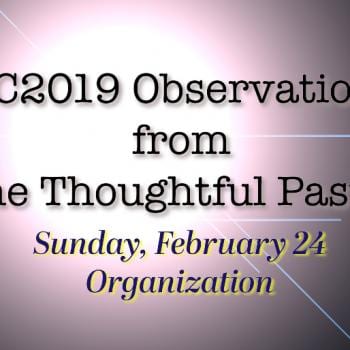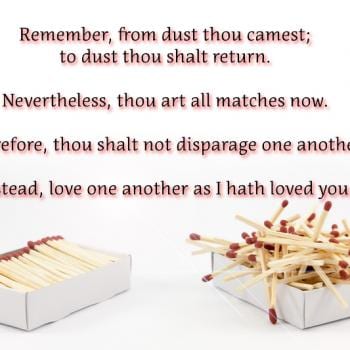And I also contend that the UMC connection, with its politically-influenced appointment process, really only works well for the rich and well-funded churches and their highly select clergy, but not so well for the smaller, less well-funded and less influential charges and clergy.
At the height of their summer glory, the elephant ears gracing the front of the parsonage where I live looked like something this:

After the unusually early and quite hard frost we experienced here on Nov. 12, I found this one lone ear still when I trimmed back the dead foliage.

A bit heartbreaking to lose them so early–they had survived the summer heat unusually well and still were full of life just before the frost. But now they have gone to an early winter sleep and, I trust, they will see their resurrection again in the spring.
But I won’t be here to see that. Someone else will be living here and either will, or will not, nurture their rebirth.
Nearly five months ago now, I let the Bishop and the District Superintendent know that it had become necessary for me to retire as of December 31, 2013. As I’ve written elsewhere, this painful and complex decision appeared the best of all the options available both for me and for the church I have faithfully served.
But now, I feel more than a bit like a birth mother who is about to give her child over to an adoptive parent who really doesn’t seem to care about my child.
I find myself in deep sympathy with President Obama, who made promises about the availability and ease of use of the websites for the Affordable Care Act based on assurances of others. For I have made promises to this church that they would know of their new pastor by now–based on the assurances of others. “Yes, of course you will know by your October 29 Charge Conference.” At the Charge Conference itself, “The discussion of the appointment here only came to the table last week but you will certainly know after the Nov. 7 Cabinet meeting. You are the most important appointment we are making this fall.” After no word from the Nov. 7 Cabinet meeting, a text sent to the chair of the SPRC chair after an inquiry read something like this, “The Cabinet meets again on November 20 and perhaps there will be a decision by then.”
Maybe. Maybe not. Church members sensed they have been lied to. All my assurances mean nothing any more. Anxiety rises. Time gets short. The handoff will not be smooth. No two ways about it. It won’t be smooth.
This is not an entry-level church. We’re complex, stretched, full of life, and short-staffed. The last thing I want is for the next pastor to “fill my shoes.” I want that person to fill only his/her own shoes. But a good map gives important guidance as to where those shoes will need to tarry for a bit while preparing to make new paths and fresh footsteps.
And it brings up to me yet once again all sorts of questions about the appointment process, particularly because many of the people in this church do not have UMC backgrounds and are growing increasingly troubled by the way we have been left hanging here.
I have long contended that a connectional system, for all its problems, still serves the kingdom of heaven better than a series of independent churches which function without accountability. I also think that pastoral search committees pose for more dangers to the local church than a Bishop and Cabinet who can make those decisions based on intimate knowledge of the local charges and of the gifts and graces of the clergy in their care.
And I also contend that the UMC connection, with its politically-influenced appointment process, really only works well for the rich and well-funded churches and their highly select clergy, but not so well for the smaller, less well-funded and less influential charges and clergy. Now, that’s the way the world has always worked–but we, in the church, are really supposed to operate differently. Seriously. We really are supposed to be different. We’re supposed to be a place where the last become first, where the least are honored, where the lost are found, where the littlest find intimate welcome.
But we don’t. And we won’t. Because money is always the driver. And we’re not moneyed out here in Krum. No uber-rich among us. Our budget is met by deeply sacrificial giving on the part of ordinary people with modest incomes.
We’re vital–no two ways about that. But Krum is a small, still fairly rural although rapidly turning suburban, community. We burst with life, with children, with ministry, with gospel-transformation, with forgiveness and covenant and love. We emerge from worship with light all over us, and we enter the world of darkness with that gracious light and give it away. That’s who we are.
But we’re not rich. We’re not big. And we don’t appear to matter very much.
And I am one very unhappy clergy in a connection I have vowed to serve and honor right now.
Again, those elephant ears may, or may not, see their resurrection in the spring. The new occupant of this parsonage could dig them up, till them under, or otherwise destroy the soon to be dormant bulbs which need their undisturbed winter rest to see their spring resurrection. Nurture, and the hand-off, matters.
This church may, or may not, see its resurrection from our dark and discouraged time as well. But these good people need the nurture of a pastor who walks in properly prepared to guide them through their winter.
It’s the right thing to do. But again, we’re not rich. We’re not big. We don’t matter.
Except in the eyes of God.
















